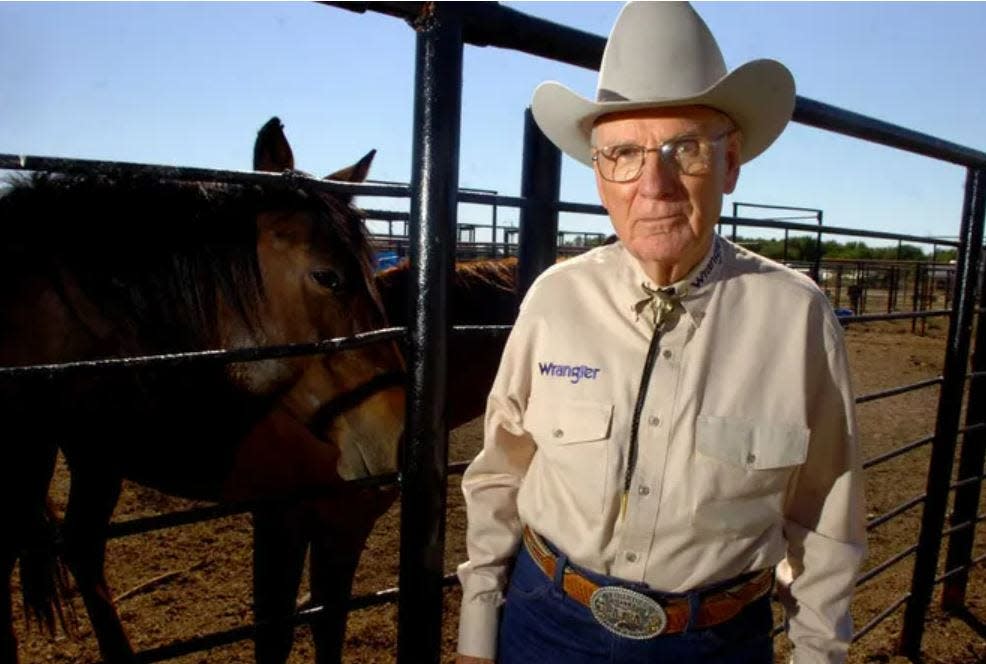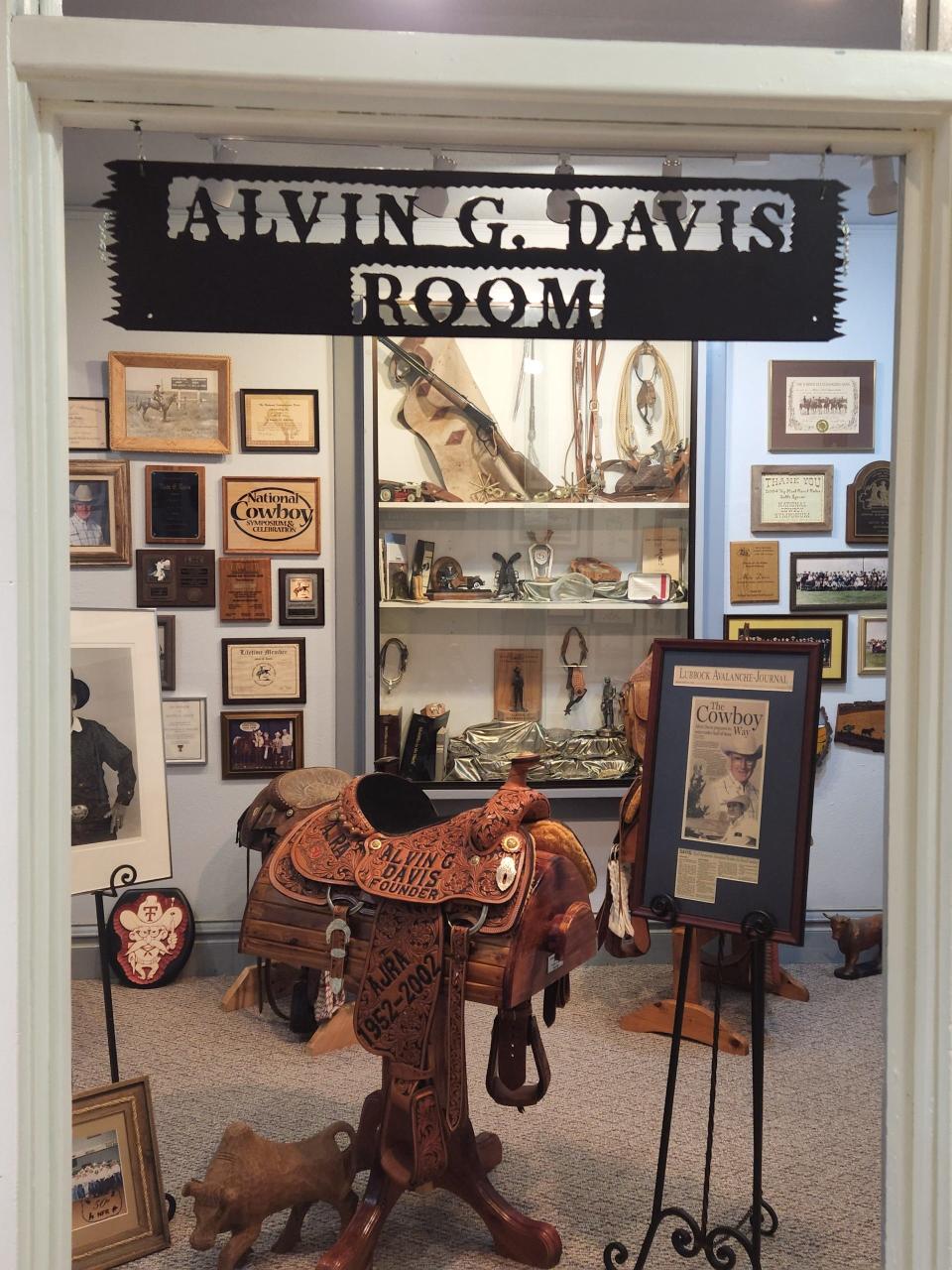"Mr. Cowboy Culture": Rodeo, ranching legend Alvin Davis praised for impact on West Texas

- Oops!Something went wrong.Please try again later.
Rodeo legend Alvin Davis died last week at age 94, leaving behind an impeccable legacy on both the cowboy community and West Texas.
Over the years, halls of fame, ranching institutions and leaders in his many areas of interest praised Davis for his contributions to ranching, rodeo and the cowboy culture.
A lifelong passion
From an early age, the Garza County native devoted his life to promoting western heritage and cowboy culture after he saw his lifelong hero, Will Rogers, at the Texas Cowboy Reunion in Stamford just months before Rogers was killed.
Although Davis wanted to be a calf roper, he told Rodeo News in 2014 that his modest frame made that a challenge. As he described it, he was 140 pounds “soaking wet,” making the task tough, so he instead dedicated himself to the practice through decades-long support.
Before he graduated from Texas Tech with his bachelor’s degree in animal production in 1952, Davis served as student president of the Tech 4-H Club and Tech Rodeo Association. But his work for the university didn’t end when he received his diploma.
From 1981 until his retirement in 1993, Davis was the executive vice president and general manager of the National Ranching Heritage Center at Texas Tech, greeting tourists day in and day out to share with them the history behind – and all the secrets to – the cowboy way of life.
Davis was also a 21-year member of the Masked Rider Committee and became the first honorary Masked Rider on its 50th anniversary in 2004.
Additionally, in 1991, he helped established the Alvin G. and Barbara A. Davis Rodeo Scholarship, which awarded to undergraduate and graduate students at Texas Tech University who have interest in and participate in the Texas Tech University Rodeo Association activities.
Outside of his work at Texas Tech, Davis produced the World’s Original All-Junior Rodeo and formed the American Junior Rodeo Association -- one of the first youth rodeo organizations in the nation.
He served on board of the American Cowboy Culture Association for years, eventually leading to his role as chairman, and founded the National Cowboy Symposium & Celebration -- which brings strangers to the culture and long-experienced cowboys to celebrate through cowboy poetry, chuckwagon cook-offs, western music and horse-handling demonstrations.
Halls of Fame
His hard-worked efforts earned him the opportunity to become the first inductee to the Texas Tech Rodeo Hall of Fame and an inductee of the Texas Rodeo Hall of Fame, which honors individuals “dedicated to preserving the history and heritage of the Texas rodeo cowboy, while also promoting the future of rodeo in Texas and beyond.”
He was also named into the 4-H Hall of Fame in 2010.

"The odds were a million to one when I was named the Top 4-H Boy in the nation in 1948," he told the Lubbock Avalanche-Journal at the time of his 4-H Hall of Fame induction. "Now, the odds were 10 million to one against me (for the Hall of Fame induction)."
Among his many other accolades: A bronze bust with his features at the main entrance of Texas Tech’s Animal and Food Sciences building and an entire room dedicated to him at the Garza County Historical Museum, based in Post, near where he was born and raised.
“He was a real icon for us, and we loved everything about him,” said Pat Cruse, who works for the museum. “He’s been a great asset to Post his entire life.”
A spokesperson with the Texas Tech University Davis College of Agricultures Sciences and Natural Resources said he’s played an “instrumental role” in the college and the lives of thousands of students, while the Lubbock Avalanche-Journal's associate editor wrote in his Fourth of July tribute column that Davis' character is one of the traits that “make America great.”
Author Cynthia Buchanan, in another commentary written for the Avalanche-Journal in this Sunday's edition, praised "Mr. Cowboy Culture" for his incomparable impact.
From a young age, Davis displayed a passion for a lifestyle and culture he hoped to share with others. In 1943, he wrote the poem, "I Want to be A Leader," as a Post High School student after his first trip to the National 4-H Club Congress in Chicago.
"When I became a 4-H member it was with very great joy / Just like a small child with a brand-new toy,” reads part of the poem, which was shared in the 2010 A-J story about his 4H induction. "The thing I want the most in this 4-H pilgrim land/ Is to guide a younger member and to lend a helping hand/ So that when his work is over and his 4-H life is done/ That I may say in earnest that I helped him when he won."
This article originally appeared on Lubbock Avalanche-Journal: Rodeo, ranching legend Alvin Davis praised for impact on West Texas

